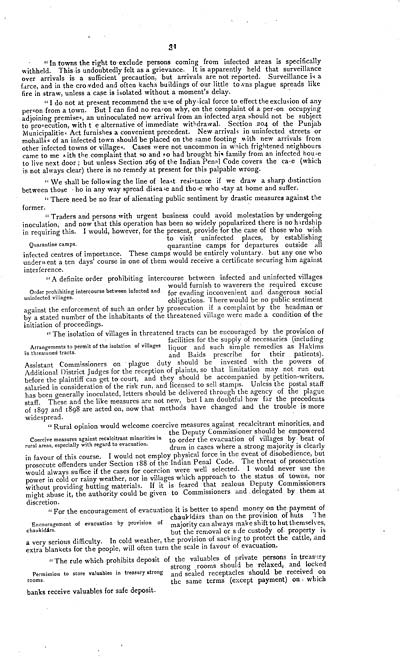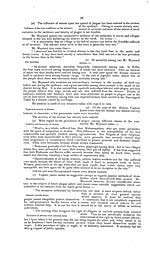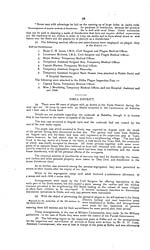Medicine - Disease > Report on plague in the Punjab from October 1st ... to September 30th ..., being the ... season of plague in the province
(45) Page 31
Download files
Individual page:
Thumbnail gallery: Grid view | List view

31
" In towns the right to exclude persons coming from infected areas is specifically
withheld. This is undoubtedly felt as a grievance. It is apparently held that surveillance
over arrivals is a sufficient precaution, but arrivals are not reported. Surveillance is a
farce, and in the crowded and often kacha buildings of our little towns plague spreads like
fire in straw, unless a case is isolated without a moment's delay.
" I do not at present recommend the use of physical force to effect the exclusion of any
person from a town. But I can find no reason why, on the complaint of a person occupying
adjoining premise, an uninoculated new arrival from an infected area should not be subject
to prosecution, with t e alternative of immediate withdrawal. Section 204 of the Punjab
Municipalitie Act furnishes a convenient precedent. New arrivals in uninfected streets or
mohalls of an infected town should be placed on the same footing with new arrivals from
other infected towns or villages. Cases were not uncommon in which frightened neighbours
came to me with the complaint that so and so had brought his family from an infected house
to live next door ; but unless Section 269 of the Indian Penal Code covers the case (which
is not always clear) there is no remedy at present for this palpable wrong.
" We shall be following the line of least resistance if we draw a sharp distinction
between those ho in any way spread disease and those who stay at home and suffer.
" There need be no fear of alienating public sentiment by drastic measures against the
former.
Quarantine camps.
Order prohibiting intercourse between infected and
uniniected villages.
Arrangements to permit of the isolation of villages
in threatened tracts.
Coercive measures against recalcitrant minorities in
rural areas, especially with regard to evacuation.
Encouragement of evacuation by provision of
chaukdrs.
Permission to store valuables in treasury strong
rooms.
" Traders and persons with urgent business could avoid molestation by undergoing
inoculation, and now that this operation has been so widely popularized there is no hardship
in requiring this. I would, however, for the present, provide for the case of those who wish
to visit uninfected places, by establishing
quarantine camps for departures outside all
infected centres of importance. These camps would be entirely voluntary, but any one who
underwent a ten days' course in one of them would receive a certificate securing him against
interference.
" A definite order prohibiting intercourse between infected and uninfected villages
would furnish to waverers the required excuse
for evading inconvenient and dangerous social
obligations. There would be no public sentiment
against the enforcement of such an order by prosecution if a complaint by the headman or
by a stated number of the inhabitants of the threatened village were made a condition of the
initiation of proceedings.
The isolation of villages in threatened tracts can be encouraged by the provision of
facilities for the supply of necessaries (including
liquor and such simple remedies as Hakims
liquor and such simple remedies as Hakims
and Baids prescribe for their patients).
Assistant Commissioners on plague duty should be invested with the powers of
Additional District Judges for the reception of plaints, so that limitation may not run out
before the plaintiff can "get to court, and they should be accompanied by petition-writers,
salaried in consideration of the risk run., and licensed to sell stamps. Unless the postal staff
has been generally inoculated, letters should be delivered through the agency of the plague
staff. These and the like measures are not new, but I am doubtful how far the precedents
of 1897 and 1898 are acted on, now that methods have changed and the trouble is more
widespread.
" Rural opinion would welcome coercive measures against recalcitrant minorities, and
the Deputy Commissioner should be empowered
Coercive measures against recalcitrant minorities in to order the evacuation of villages by beat of
drum in cases where a strong majority is clearly
in favour of this course. I would not employ physical force in the event of disobedience, but
prosecute offenders under Section 188 of the Indian Penal Code. The threat of prosecution
would always suffice if the cases for coercion were well selected. I would never use the
power in cold or rainy weather, nor in villages which approach to the status of towns, nor
without providing hutting materials. If it is feared that zealous Deputy Commissioners
might abuse it, the authority could be given to Commissioners and delegated by them at
discretion.
" For the encouragement of evacuation it is better to spend money on the, payment of
chaukdrs than on the provision of huts The
majority can always make shift to but themselves,
but the removal or safe custody of property is
a very serious difficulty. In cold weather, the provision of sacking to protect the cattle, and
extra blankets for the people, will often turn the scale in favour of evacuation.
The rule which prohibits deposit of the valuables of private persons in treasury
strong rooms should be relaxed, and locked
and sealed receptacles should be received on
the same terms (except payment) on . which
banks receive valuables for safe deposit.
" In towns the right to exclude persons coming from infected areas is specifically
withheld. This is undoubtedly felt as a grievance. It is apparently held that surveillance
over arrivals is a sufficient precaution, but arrivals are not reported. Surveillance is a
farce, and in the crowded and often kacha buildings of our little towns plague spreads like
fire in straw, unless a case is isolated without a moment's delay.
" I do not at present recommend the use of physical force to effect the exclusion of any
person from a town. But I can find no reason why, on the complaint of a person occupying
adjoining premise, an uninoculated new arrival from an infected area should not be subject
to prosecution, with t e alternative of immediate withdrawal. Section 204 of the Punjab
Municipalitie Act furnishes a convenient precedent. New arrivals in uninfected streets or
mohalls of an infected town should be placed on the same footing with new arrivals from
other infected towns or villages. Cases were not uncommon in which frightened neighbours
came to me with the complaint that so and so had brought his family from an infected house
to live next door ; but unless Section 269 of the Indian Penal Code covers the case (which
is not always clear) there is no remedy at present for this palpable wrong.
" We shall be following the line of least resistance if we draw a sharp distinction
between those ho in any way spread disease and those who stay at home and suffer.
" There need be no fear of alienating public sentiment by drastic measures against the
former.
Quarantine camps.
Order prohibiting intercourse between infected and
uniniected villages.
Arrangements to permit of the isolation of villages
in threatened tracts.
Coercive measures against recalcitrant minorities in
rural areas, especially with regard to evacuation.
Encouragement of evacuation by provision of
chaukdrs.
Permission to store valuables in treasury strong
rooms.
" Traders and persons with urgent business could avoid molestation by undergoing
inoculation, and now that this operation has been so widely popularized there is no hardship
in requiring this. I would, however, for the present, provide for the case of those who wish
to visit uninfected places, by establishing
quarantine camps for departures outside all
infected centres of importance. These camps would be entirely voluntary, but any one who
underwent a ten days' course in one of them would receive a certificate securing him against
interference.
" A definite order prohibiting intercourse between infected and uninfected villages
would furnish to waverers the required excuse
for evading inconvenient and dangerous social
obligations. There would be no public sentiment
against the enforcement of such an order by prosecution if a complaint by the headman or
by a stated number of the inhabitants of the threatened village were made a condition of the
initiation of proceedings.
The isolation of villages in threatened tracts can be encouraged by the provision of
facilities for the supply of necessaries (including
liquor and such simple remedies as Hakims
liquor and such simple remedies as Hakims
and Baids prescribe for their patients).
Assistant Commissioners on plague duty should be invested with the powers of
Additional District Judges for the reception of plaints, so that limitation may not run out
before the plaintiff can "get to court, and they should be accompanied by petition-writers,
salaried in consideration of the risk run., and licensed to sell stamps. Unless the postal staff
has been generally inoculated, letters should be delivered through the agency of the plague
staff. These and the like measures are not new, but I am doubtful how far the precedents
of 1897 and 1898 are acted on, now that methods have changed and the trouble is more
widespread.
" Rural opinion would welcome coercive measures against recalcitrant minorities, and
the Deputy Commissioner should be empowered
Coercive measures against recalcitrant minorities in to order the evacuation of villages by beat of
drum in cases where a strong majority is clearly
in favour of this course. I would not employ physical force in the event of disobedience, but
prosecute offenders under Section 188 of the Indian Penal Code. The threat of prosecution
would always suffice if the cases for coercion were well selected. I would never use the
power in cold or rainy weather, nor in villages which approach to the status of towns, nor
without providing hutting materials. If it is feared that zealous Deputy Commissioners
might abuse it, the authority could be given to Commissioners and delegated by them at
discretion.
" For the encouragement of evacuation it is better to spend money on the, payment of
chaukdrs than on the provision of huts The
majority can always make shift to but themselves,
but the removal or safe custody of property is
a very serious difficulty. In cold weather, the provision of sacking to protect the cattle, and
extra blankets for the people, will often turn the scale in favour of evacuation.
The rule which prohibits deposit of the valuables of private persons in treasury
strong rooms should be relaxed, and locked
and sealed receptacles should be received on
the same terms (except payment) on . which
banks receive valuables for safe deposit.
Set display mode to: Large image | Zoom image | Transcription
Images and transcriptions on this page, including medium image downloads, may be used under the Creative Commons Attribution 4.0 International Licence unless otherwise stated. ![]()
| India Papers > Medicine - Disease > Report on plague in the Punjab from October 1st ... to September 30th ..., being the ... season of plague in the province > (45) Page 31 |
|---|
| Permanent URL | https://digital.nls.uk/74579394 |
|---|




